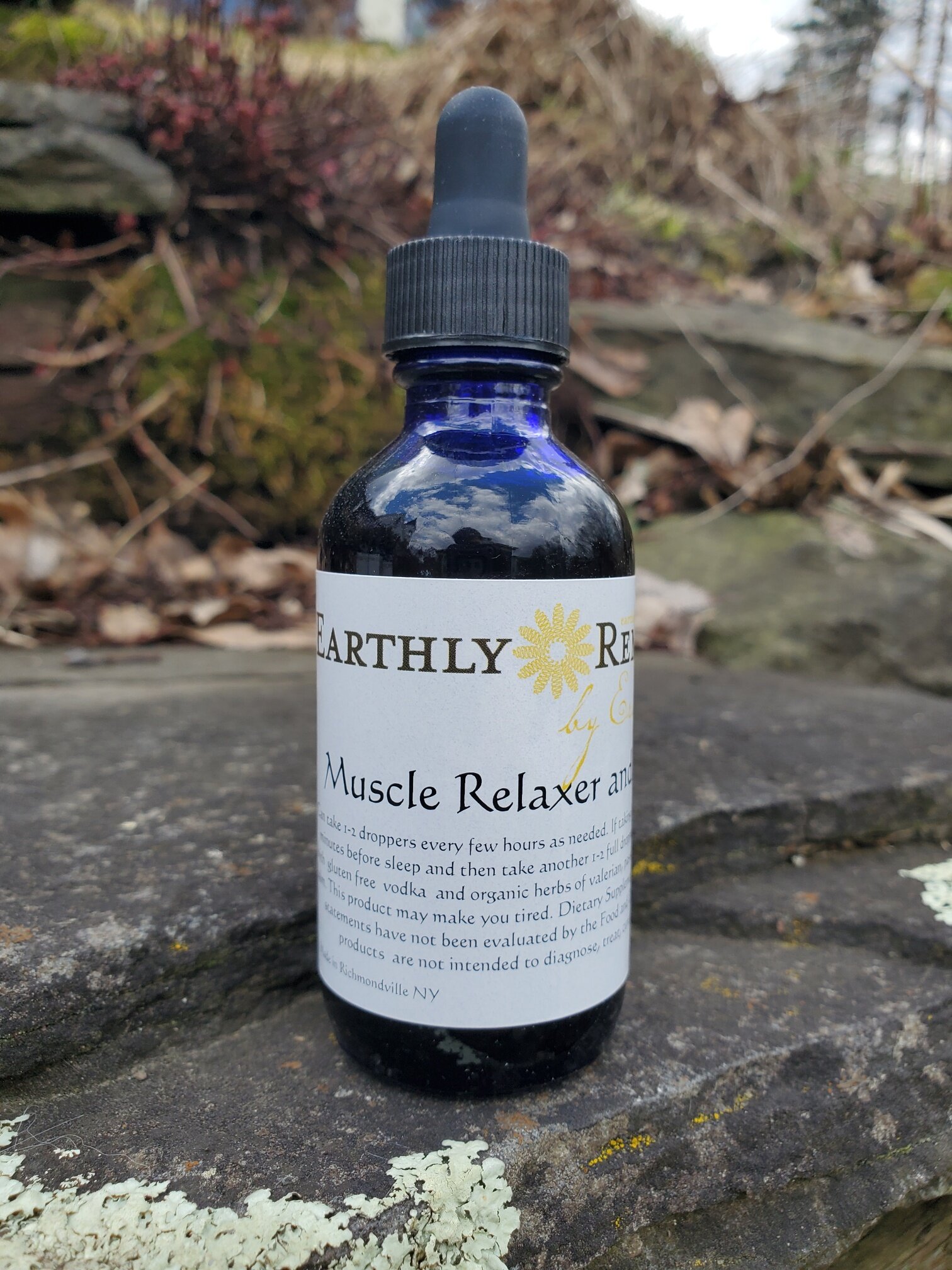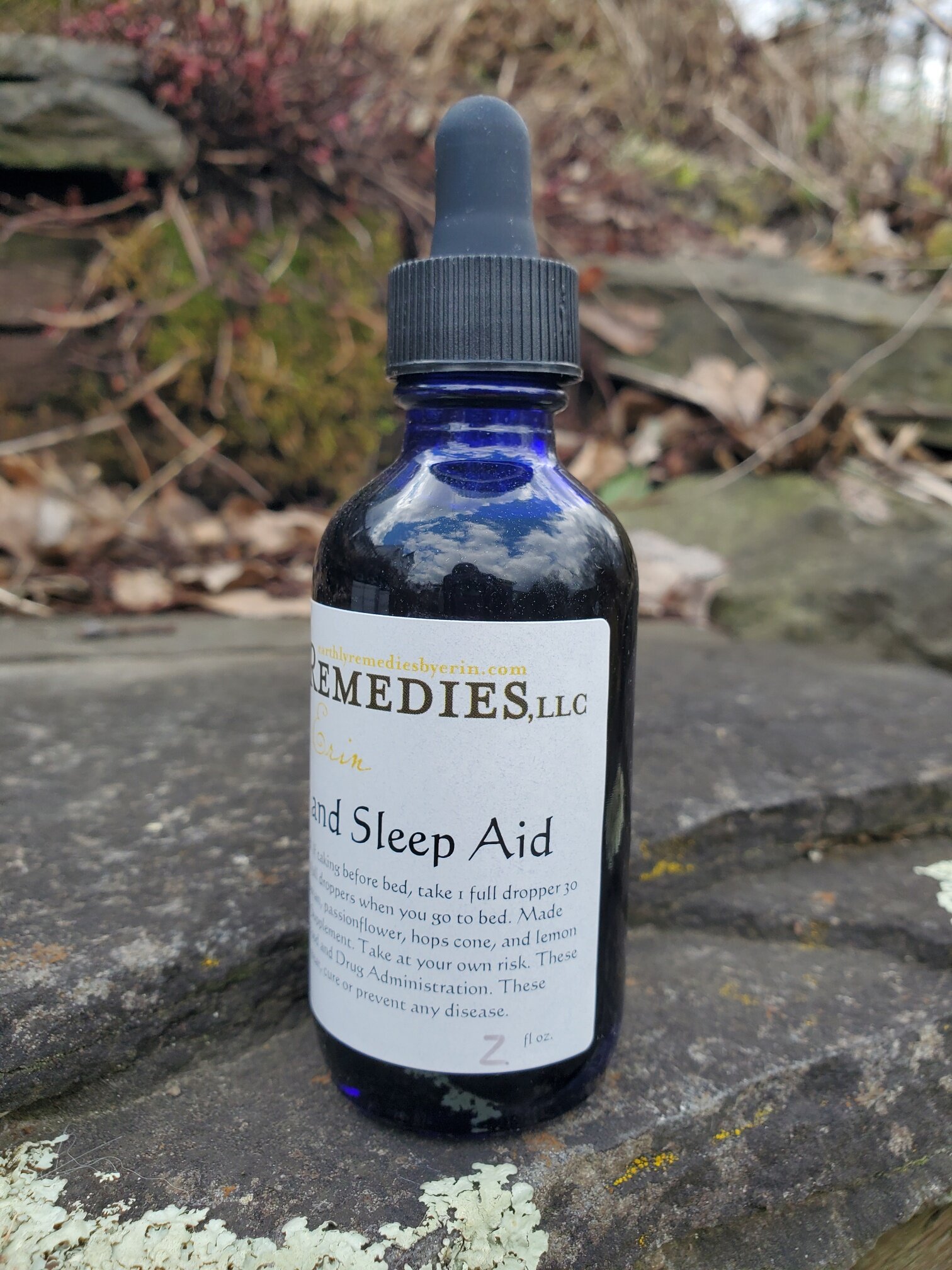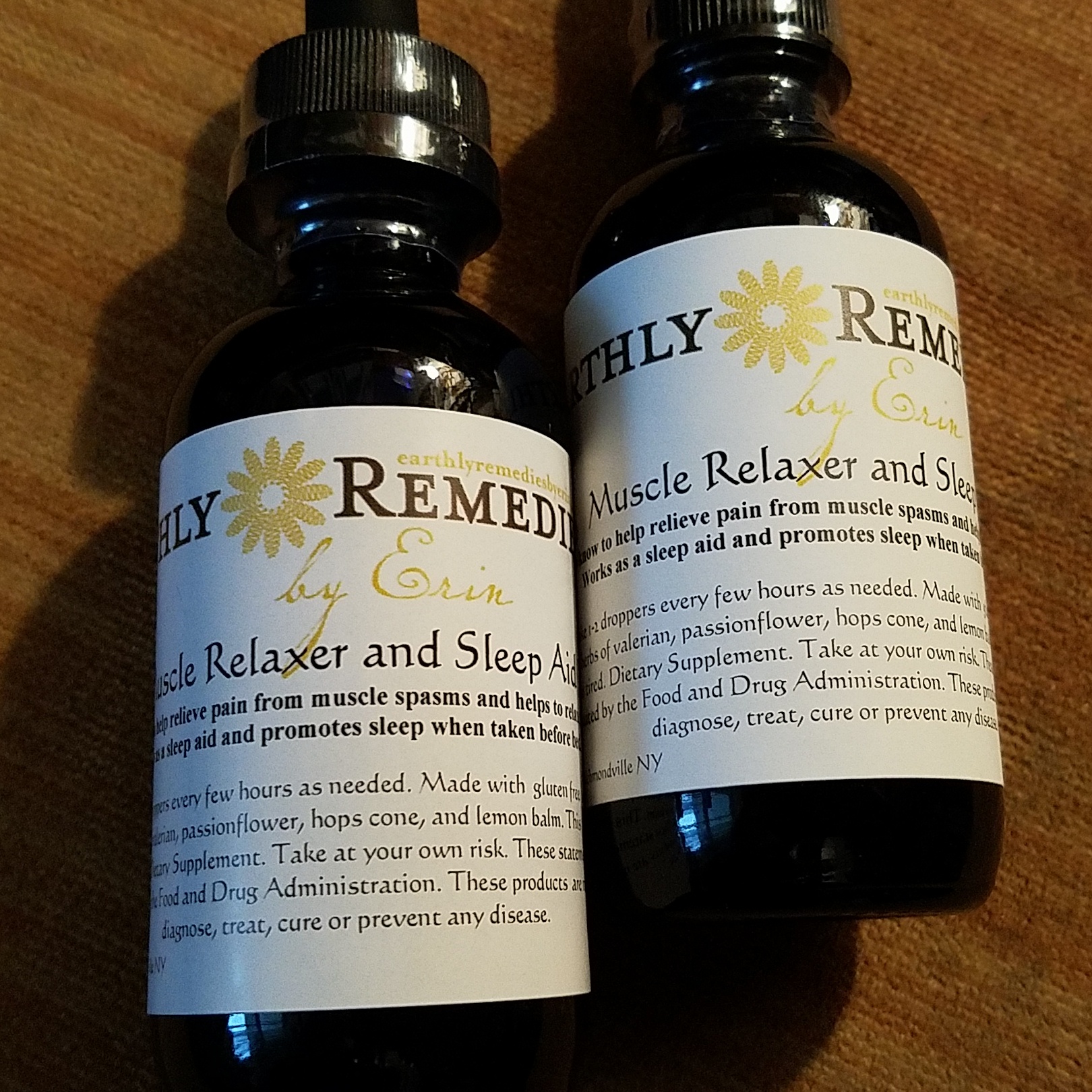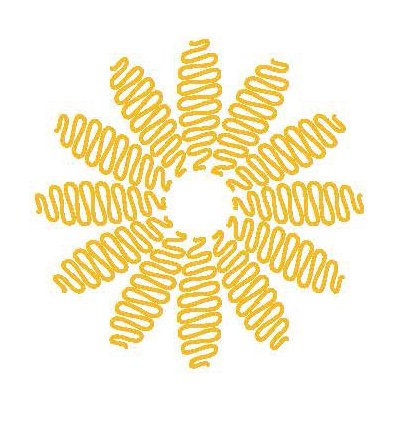Muscle Relaxer and Sleep Aid




Muscle Relaxer and Sleep Aid
Helps to relieve pain from muscle spasms and helps to relax the muscle. Good for pulled muscles and any kind of muscle pain. Helps to promote sleep when taken before bed. Helps to quite the mind when your thoughts are racing.
Take 1-2 droppers every few hours as needed or 30 minutes before bed. Made with organic gluten free alcohol and organic herb blend of valerian, passionflower, hops, and lemon-balm.
This product may make you tired.
Lemon balm (Melissa officinalis)given its antidepressant, nervine, antiviral, and antimicrobial properties. It is extremely easy to grow. So easy, it can be considered invasive and a bit weedy so if you wanted to try growing some, I would recommend putting the lemon balm somewhere that you can let it take over. I have seen it successfully grown in containers and winter over from year to year. That is also a good way to keep it contained. Lemon balm grows to be about 2-3 feet high and has heart shaped oval leaves that are toothed and look slightly hairy. It has an amazing fresh lemon scent. It has tiny white/pinkish flowers.
I try and harvest lemon balm before it goes to flower. It can be cut at the base of the plant, and it will grow back. You can cut it 2-3 times throughout the season. I love to harvest it fresh for tincturing, but I also dry some and use it throughout the winter in teas. If drying, keep the leaves out of the sunlight because they tend to turn brown. If you can dry them on low heat in a dehydrator and check often, they will keep that beautiful green color.
I am a big fan of using lemon balm for tea. I call it happiness in a cup or a bottle (for the tincture). It can quite literally help your mood and your stress level when having a rough day almost immediately. (I think I might have to have a cup around the holidays.) I find it quite amazing because it is so mild but yet so effective. It is safe to use for kids and because the flavor is yummy I have yet to find a kid who doesn’t like it. Especially with a little bit of honey. It is great for mental stress, sleep, and upset stomachs from stress. There have been studies done using lemon balm for insomnia and anxiety with benefits because it helps increase the GABA that is available in the brain. GABA is an amino acid that helps regulate mood. There have been several clinical studies done of the positive effects of lemon balm for mood and the research has found it quite significant in increasing calmness and helping for mild depression. When combined with other herbs like passionflower for its sedative properties it is helpful for improving sleep quality to get a better night’s sleep.
Lemon balm does more than just put a smile on your face, it is good for overall health. It has antiviral and antimicrobial properties making it great for cold and flu seasons. When used as a hot tea it can help promote sweating and so it is recommended for use in bringing down fevers. It can be used to address chickenpox and shingles. It can be used after childbirth to help with the afterbirth pains. It is recommended that if you want to take lemon balm and you have any kind of thyroid condition to work with a trained herbalist. When taken in large doses it has thyroxine-inhibiting effects and can negatively affect thyroid medication.
Passionflower (Passiflora incarnata L.)
Lemon Balm (Melissa officinalis)
Let’s talk winter, seasonal blues, and the lack of sunshine. I am sure at some point you have experienced this - especially while living in the northeast. This time of year, the days seem like they are getting slightly longer, but let’s admit that it’s still dark, cold, and still very much winter outside. This is the time of year when I look to passionflower and lemon balm for comfort. These two herbs complement each other and work well in blends or by themselves.
Passionflower has antispasmodic and sedative properties which makes it an excellent herb choice for sleep problems such as insomnia and restlessness. It is used for nervous system disorders, muscle spasms, twitching, helps to lower blood pressure, reduces anxiety and stress, is helpful for spasmodic coughs like asthma, pneumonia, and croup. Its ability to help reduce anxiety and help with sleep is AMAZING.
Lemon balm has antidepressant, antispasmodic, and antiviral effects which I think makes it a great winter herb. Not only does it help your mood, but it helps your immune system as well. Lemon balm is good for sleep disturbances, anxiety, seasonal affective disorder (SAD), helps with nervousness, upset stomachs, and hyperactivity; lemon balm also has uplifting properties. The lemon scent sometimes is enough to help activate a euphoric feeling. It is safe to use with young children which makes is especially useful. For kids and adults who get upset bellies and have any kind of stress, a nice cup of hot lemon balm tea in the morning before you start your day or even after school and/or work might be all you need.
For any of you experiencing feelings of winter blues, cabin fever, or insomnia because you aren’t as active during the winter months, then I highly recommend trying some passionflower and/or lemon balm.
The benefit of using passionflower or lemon balm is that they don’t make you groggy or sleepy when you wake in the morning. You wake feeling refreshed and alert. When using it during the day it helps to calm you down and can increase concentration during your awake hours.
Passionflower is zoned for regions above 7 which makes it a perennial in some areas down south. The fast-growing vine can grow up to 30 feet but about 10 feet is more typical. The mother plant sends it shoots underground which helps it to spread rapidly. It can be more of a weed in places like Florida since it doesn’t die off the same way that it does up north. Unfortunately, up here in NY, our region is too cold for it to come back after the winter months. I was able to winter it over once in my greenhouse in one of the beds - it died back in the winter, but in the spring, I had new shoots emerge. It is typically grown as an annual in the colder climates. I often refer to passionflower as an alien life-form because of the exotic and amazing features of the petals and flower. There is no other flower that compares to it in my opinion, and I feel it holds special magical qualities. Down south the plant can go to fruit and is referred to as the Maypop, but I have never seen that happen up north. The Cherokee used the fruit and leaves as a food source. I can honestly say I have never seen the fruit; I’ve only seen pictures. The roots, flowers and the leaves have wonderful medicinal qualities. Any of the literature that I find regarding the history of passionflower talks more of the Cherokees using only the roots for medicines. During the botanical movement in the 1800s there was mention of using the ariel parts. All parts of the plant are still used, but the leaves and flowers are the primary part that get used these days.
Lemon balm can be found all over Europe and North America. It can be a bit weedy and invasive depending on where planted. It is in the mint family and really has a wonderful scent. It prefers the sun but can grow in the shade. The best time to harvest lemon balm is before it goes to flower. It can be used fresh or dried. It’s a popular culinary herb and is loved by bees. Lemon balm was a common herb in potpourri blends because of its sweet smell and was used to ward off evil spirits. Lemon balm was used by the Greeks and Romans to flavor wines and as a poultice for wounds.
I have successfully grown passionflower in a pot and recommend it to anyone who is interested in growing it. You can buy plants or seeds from Richters Herbs and Strictly Medicinal Seeds. Unfortunately, it doesn’t always flower, but you can harvest the leaves and dry them for tea. If you bring your plant inside for the winter it will winter over for you. Lemon balm is extremely easy to grow and does well in a pot or the ground (just remember it spreads). You can get plants from Fedco, and you can check for plants outside in the spring at honest weight food coop. You can also look for them at other local places that sell herb plants.
Valerian (Valerian officinalis) is the garden variety of valerian. Valerian is a perennial that can grow around three feet high. It has small pinkish-white flowers and will grow wildly along roadways here in NY. It blooms in early June, and it is best to harvest the roots either in the spring or fall. The roots are what get used the most in medicine making but the flowers are also used when making a flower essence. It is best to wait until the plants are 4 or 5 years old because the roots will be bigger, and you can cut the flower tops to allow the roots to grow bigger.
I love the smell of fresh valerian - I think it has a sweet smell. Some folks say the roots smells like stinky socks. I think the roots have a stronger, more offensive smell after they have been dried. The tincture definitely has a pungent and bitter taste. I think it is better when used in combination with other herbs like lemon balm, especially if someone has a difficult time taking it because of the flavor. The tincture is easier to take than tea.
When most people hear valerian, they think sleep, which is exactly what it gets used for. Not only is valerian good for promoting sleep but it is considered a nervine hypnotic which implies it can induce a state of hypnosis which is conducive to falling asleep. It is for that reason that it is recommended that most people use valerian in the evening time. Those with severe anxiety or panic attacks can benefit from taking it with other herbs throughout the day but they will want to find the right dose, so it doesn’t make them too tired. Valerian is great for insomnia, for anxiety and stress, tension, and restlessness.
Valerian is also considered a cerebral stimulant which means that it increases circulation to the brain. There are about 40% of the population that find valerian keeps them awake at night. That is because in large doses it can affect circulation and be felt in the occipital region of the brain, so it does just the opposite of what valerian is intended to do. Energetically valerian is considered a warming herb which is opposite of other hypnotic herbs that are cooling. Those that have a pre-disposed constitution to heat will find that valerian aggravates them.
I tend to be someone that can’t tolerate valerian in large dosages. I have found over the years that using it with other herbs to promote sleep in very small doses seems to do the trick. If you are someone who has tried valerian in the past with a negative response it could be the dosing. If you are willing to try it again, I would do so by blending it with other herbs and playing with the dosage. Some folks, despite playing with the dosage, still can’t take valerian for sleep and that is okay as there are other herbs like passionflower that can be used for sleep instead.
Valerian is known as an anti-spasmodic - as is the case with many other nervine sedatives and hypnotics. As Sajah Popham states “it helps to relax and settle overexcitable nerve impulse which leads to over contraction of smooth or skeletal muscles.” Just by the nature of it being anti-spasmodic it is considered “anodyne” which means it helps with the treatment of pain. Valerian is carminative helping to move and relax the gut. It brings warmth to the gut, helping to reduce spasm and increase circulation and in turn helps with digestion. You can also use valerian for loosening and relaxing cramping and tension in the female reproductive system and even in the urinary tract when stones are present.
Valerian is not recommended during pregnancy or to take large doses for an extended period of time as it can create depression and melancholy. Valerian interferes with the absorption of iron, so it is recommended not to take both at the same time.
This is a dietary supplement.
I recommend that with all the herbal tinctures you start of small in dosing and work your way up to recommended dosage. Some people only need a small amount to notice a difference.
Disclaimer: Earthly Remedies is not responsible for any individual’s use of our products. Each person’s response to herbs may differ. Consult a qualified health care practitioner or herbalist for guidance.
*These statements have not been evaluated by the Food and Drug Administration. These products are not intended to diagnose, treat, cure or prevent any disease.

